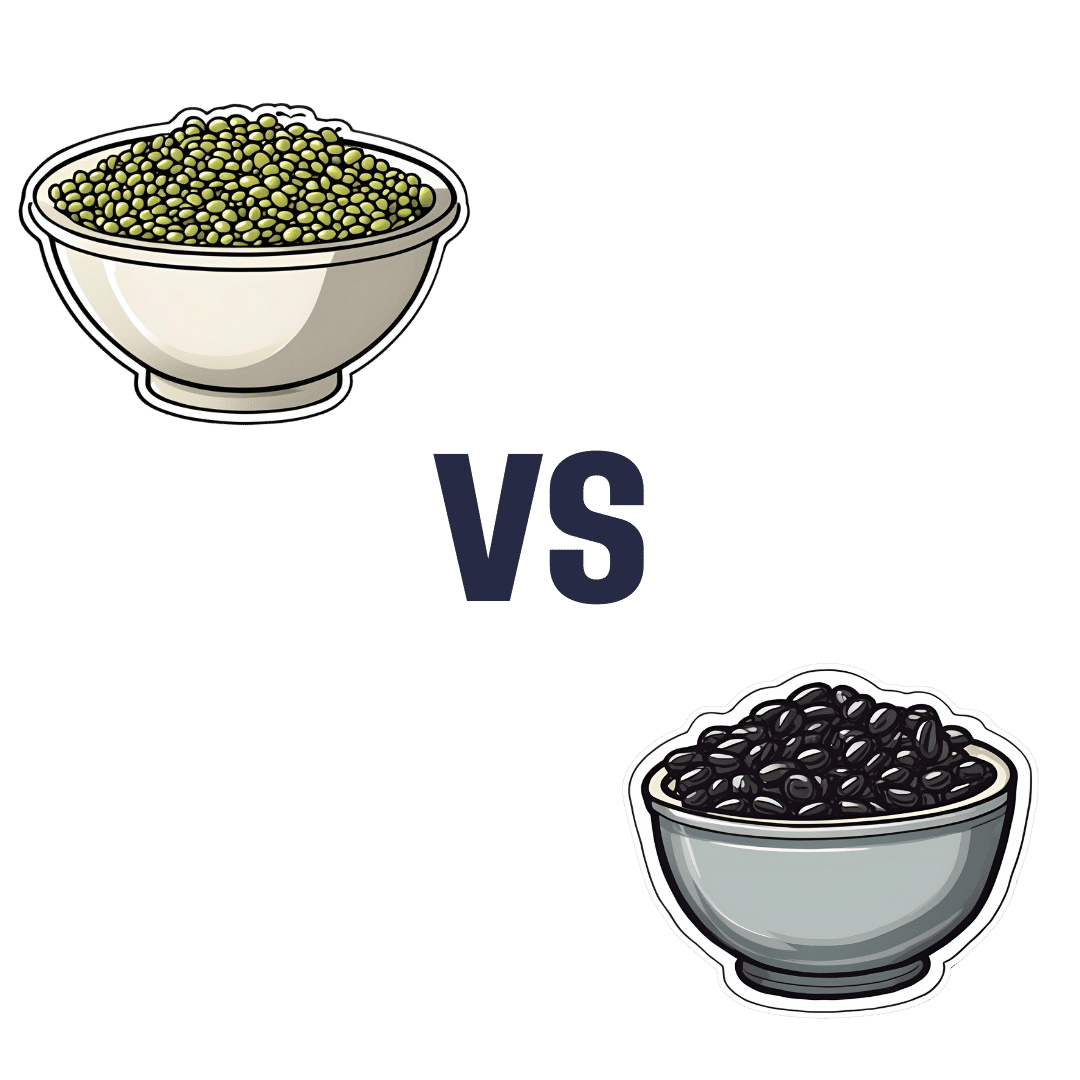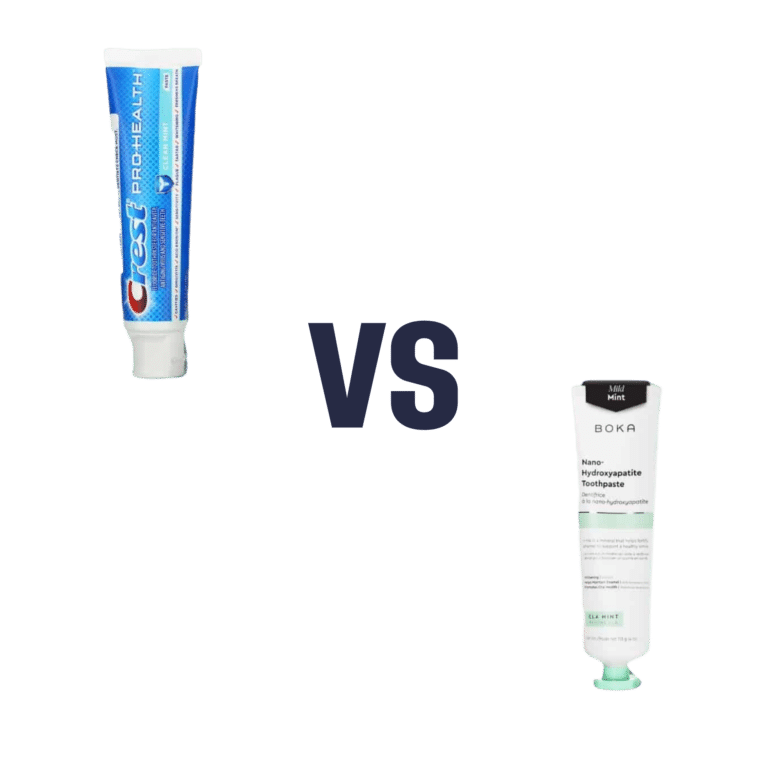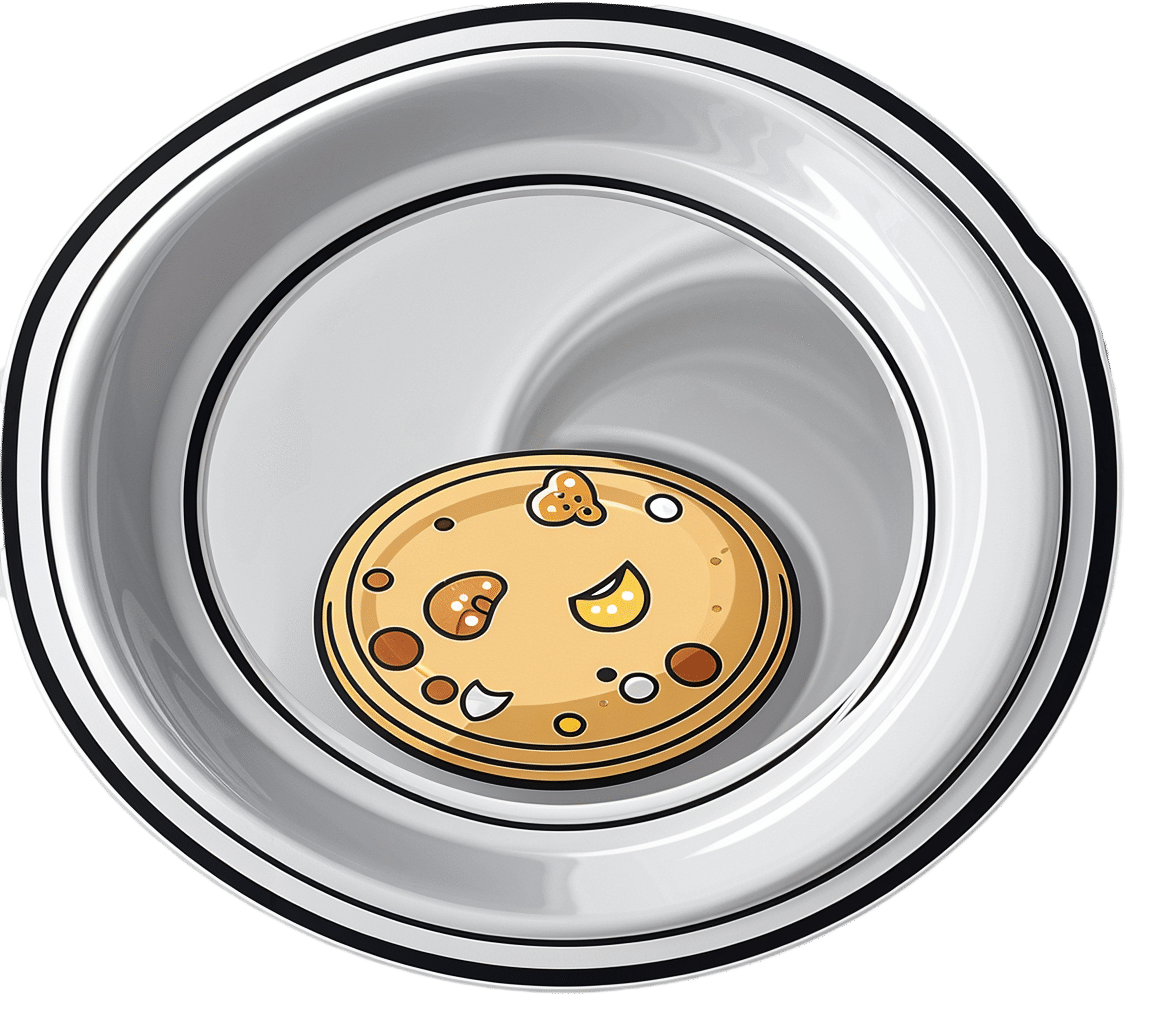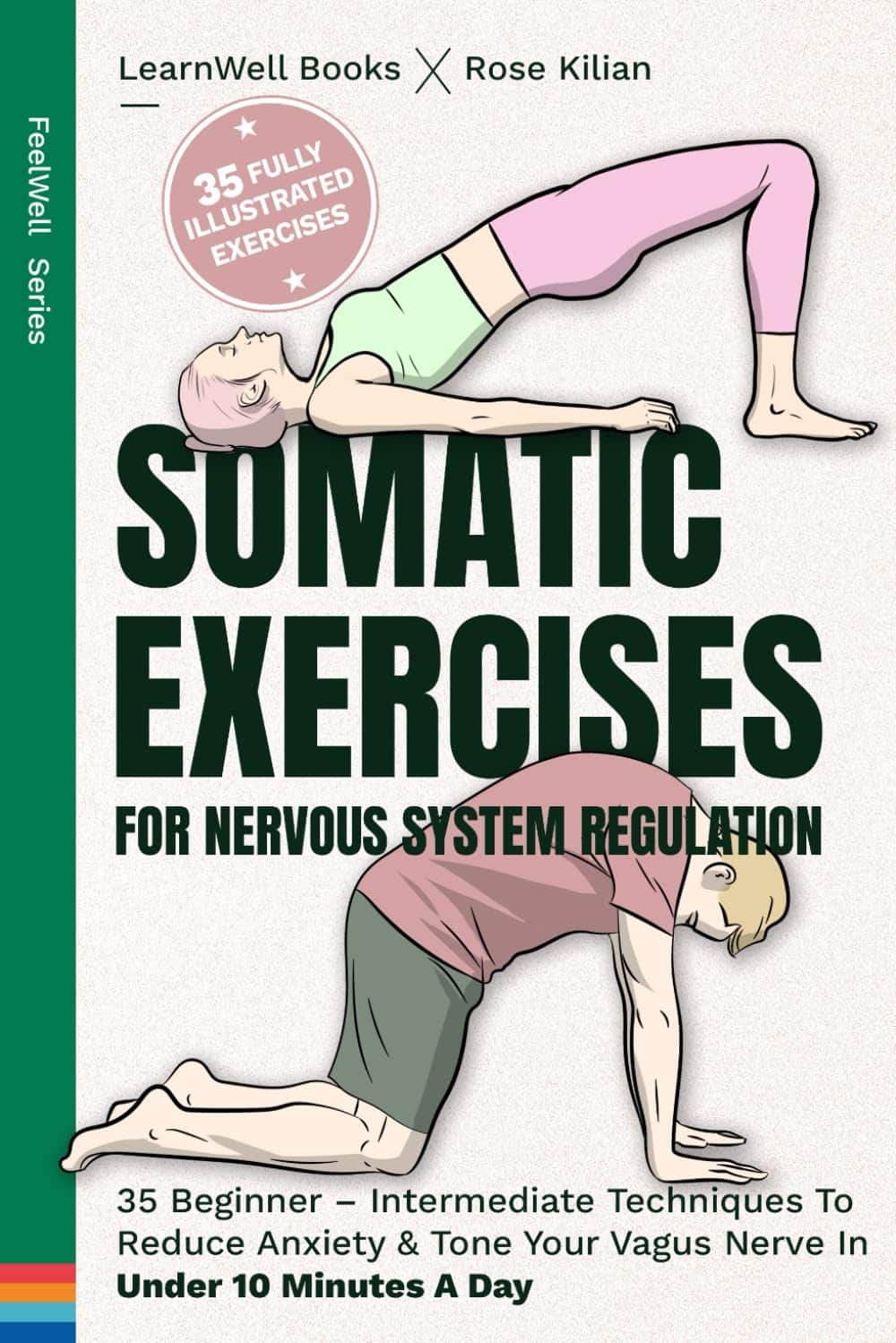
Mung Beans vs Black Beans – Which is Healthier?
10almonds is reader-supported. We may, at no cost to you, receive a portion of sales if you purchase a product through a link in this article.
Our Verdict
When comparing mung beans to black beans, we picked the black beans.
Why?
Both are great! But…
In terms of macros, black beans have more protein, carbs, and fiber, as well as the lower glycemic index (although both are already low). So, a clear win for black beans here.
In the category of vitamins, mung beans have more of vitamins A, B5, B9, and C, while black beans have more of vitamins B1, B6, E, K, and choline. Thus, a slight win for black beans this time.
When it comes to minerals, mung beans have more selenium and zinc, while black beans have more calcium, copper, iron, magnesium, manganese, phosphorus, and potassium. An easy win for black beans.
Of course, enjoy either or both—but if you’re going to pick one, we say black beans win the day.
Want to learn more?
You might like to read:
Plant vs Animal Protein: Head-to-Head
Take care!
Don’t Forget…
Did you arrive here from our newsletter? Don’t forget to return to the email to continue learning!
Recommended
Learn to Age Gracefully
Join the 98k+ American women taking control of their health & aging with our 100% free (and fun!) daily emails:
-
Apple Cider Vinegar vs Apple Cider Vinegar Gummies – Which is Healthier?
10almonds is reader-supported. We may, at no cost to you, receive a portion of sales if you purchase a product through a link in this article.
Our Verdict
When comparing apple cider vinegar (bottled) to apple cider vinegar (gummies), we picked the bottled.
Why?
There are several reasons!
The first reason is about dosage. For example, the sample we picked for apple cider vinegar gummies, boasts:
❝2 daily chewable gummies deliver 800 mg of Apple Cider Vinegar a day, equivalent to a teaspoon of liquid apple cider vinegar❞
That sounds good until you note that it’s recommended to take 1–2 tablespoons (not teaspoons) of apple vinegar. So this would need more like 4–8 gummies to make the dose. Suddenly, either that bottle of gummies is running out quickly, or you’re just not taking a meaningful dose and your benefits will likely not exceed placebo.
The other is reason about sugar. Most apple cider vinegar gummies are made with some kind of sugar syrup, often even high-fructose corn syrup, which is one of the least healthy foodstuffs (in the loosest sense of the word “foodstuffs”) known to science.
The specific brand we picked today was the best we can find; it used maltitol syrup.
Maltitol syrup, a corn derivative (and technically a sugar alcohol), has a Glycemic Index of 52, so it does raise blood sugars but not as much as sucrose would. However (and somewhat counterproductive to taking apple cider vinegar for gut health) it can cause digestive problems for many people.
And remember, you’re taking 4–8 gummies, so this is amounting to several tablespoons of the syrup by now.
On the flipside, apple cider vinegar itself has two main drawbacks, but they’re much less troublesome issues:
- many people don’t like the taste
- its acidic nature is not good for teeth
To this the common advice for both is to dilute it with water, thus diluting the taste and the acidity.
(this writer shoots hers from a shot glass, thus not bathing the teeth since it passes them “without touching the sides”; as for the taste, well, I find it invigorating—I do chase it with water, though to be sure of not leaving vinegar in my mouth)
Want to check them out for yourself?
Here they are:
Apple cider vinegar | Apple cider vinegar gummies
Want to know more about apple cider vinegar?
Check out:
- An Apple (Cider Vinegar) A Day…
- 10 Ways To Balance Blood Sugars
- How To Recover Quickly From A Stomach Bug
Take care!
Share This Post
-
Stop The World…
10almonds is reader-supported. We may, at no cost to you, receive a portion of sales if you purchase a product through a link in this article.
Some news highlights from this week:
“US vs Them”?
With the US now set to lose its WHO membership, what does that mean for Americans? For most, the consequences will be indirect:
- the nation’s scientists and institutions will be somewhat “left out in the cold” when it comes to international scientific collaboration in the field of health
- the US will no longer enjoy a position of influence and power within the WHO, which organization’s reports and position statements have a lot of sway over the world’s health practices
Are there any benefits (of leaving the WHO) for Americans? Yes, there is one: the US will no longer be paying into the WHO’s budget, which means:
- the US will save the 0.006% of the Federal budget that it was paying into the WHO annually
- for the average American’s monthly budget, that means (if the saving is passed on) you’ll have an extra dime
However, since US scientific institutions will still need access to international data, likely that access will need to be paid separately, at a higher rate than US membership in WHO cost.
In short: it seems likely to go the way that Brexit did: “saving” on membership fees and then paying more for access to less.
Why is the US leaving again? The stated reasons were mainly twofold:
- the cost of US membership (the US’s contribution constituted 15% of the the overall WHO budget)
- holding the US’s disproportionately high COVID death rate (especially compared to countries such as China) to be a case of WHO mismanagement
Read in full: What losing WHO membership means for the U.S.
Related: What Would a Second Trump Presidency Look Like for Health Care? ← this was a speculative post by KFF Health News, last year
Halt, You’re Under A Breast
More seriously, this is about halting the metastasis of cancerous tumors in the breast. It is reasonable to expect the same principle and thus treatment may apply to other cancers too, but this is where the research is at for now (breast cancer research gets a lot of funding).
And, what principle and treatment is this, you ask? It’s about the foxglove-derived drug digoxin, and how it stops cancerous cells from forming clusters, and even actively dissolves clusters that have already formed. No clusters means no new tumors, which means no metastasis. No metastasis, in turn, means the cancer becomes much more treatable because it’s no longer a game of whack-a-mole; instead of spreading to other places, it’s a much more manageable case of “here’s the tumor, now let’s kill it with something”.
Note: yes, that does mean the tumor still needs killing by some other means—digoxin won’t do that, it “just” stops it from spreading while treatment is undertaken.
Read in full: Proof-of-concept study dissolves clusters of breast cancer cells to prevent metastases
Related: The Hormone Therapy That Reduces Breast Cancer Risk & More
Force Of Habit
“It takes 21 days to make a habit”, says popular lore. Popular is not, however, evidence-based:
❝This systematic review of 20 studies involving 2601 participants challenges the prevailing notion of rapid habit formation, revealing that health-related habits typically require 2–5 months to develop, with substantial individual variability ranging from 4 to 335 days. The meta-analysis demonstrated significant improvements in habit scores across various health behaviours, with key determinants including morning practices, personal choice, and behavioural characteristics❞
So, this is not a lottery, “maybe it will take until Tuesday, maybe it will take nearly a year”, so much as “there are important factors that seriously change how long a habit takes to become engrained, and here is what those factors are”.
Read in full: Study reveals healthy habits take longer than 21 days to set in
Share This Post
-
Saffron For The Brain (& More)
10almonds is reader-supported. We may, at no cost to you, receive a portion of sales if you purchase a product through a link in this article.
Saffron For The Brain (& More)
In yesterday’s edition of 10almonds, one of the items in the “health news from around the world” section was:
Clinical trial finds herbal medicine Sailuotong effective for brain health in older people
But, what is it?
❝SaiLuoTong (SLT) is a modern compound Chinese herbal medicine preparation in capsule form containing standardized extracts of Panax ginseng, Ginkgo biloba, and Crocus sativus L❞
We’ve written previously about ginseng and ginkgo biloba:
So, what’s this about Crocus sativus L.?
That is the plant better known as saffron. And, for all its wide availability (your local supermarket probably has at least a tiny amount in the spice section), there’s a reason we don’t see much of it:
❝Saffron blooms only once a year and should be collected within a very short duration. It is picked during 3–4 weeks in October-November. The method for the cultivation of saffron contributes greatly to its high price. According to some reports, this species is a sterile triploid and so does not produce fertile seeds. Germination can take 1–6 months at 18°C. It takes 3 years for plants to flower from seed.❞
Source: Crocus sativus L.: A comprehensive review
That’s fascinating, but what does it do for us?
Well, in the words of El Midaoui et al. (2022):
❝In the frame of a double-blind-placebo-controlled study, 30 mg per day supplementation with saffron for 16 weeks resulted in improved cognitive function in patients suffering from mild to moderate Alzheimer’s disease.
Moreover, the follow-up of this study in which the authors evaluated the effects of saffron (30 mg/day) for 22 weeks showed that saffron was as effective as donepezil in the treatment of mild-to-moderate Alzheimer’s disease❞
Read the full review: Saffron (Crocus sativus L.): A Source of Nutrients for Health and for the Treatment of Neuropsychiatric and Age-Related Diseases
Not just that, but it also has powerful antioxidant and anti-inflammatory properties beyond the brain (though the brain is where research has been most focused, due to its neuroprotective effects).
(this, too, is a full research review in its own right; we’re getting a lot of “bang for buck” on papers today)
And more?
Yes, and more. Lots more. To bullet-pointify even just the abstract from another research review:
- Saffron has been suggested to be effective in the treatment of a wide range of disorders including coronary artery diseases, hypertension, stomach disorders, dysmenorrhea and learning and memory impairments.
- In addition, different studies have indicated that saffron has anti-inflammatory, anti-atherosclerotic, antigenotoxic and cytotoxic activities. (This is all good; the cytotoxic activities are about killing cancer cells)
- Antitussive effects of stigmas and petals of C. sativus and its components, safranal and crocin have also been demonstrated.
- The anticonvulsant and anti-Alzheimer properties of saffron extract were shown in human and animal studies.
- The efficacy of C. sativus in the treatment of mild to moderate depression was also reported in clinical trial.
- Administration of C. sativus and its constituents increased glutamate and dopamine levels in the brain in a dose-dependent manner.
- It also interacts with the opioid system to reduce withdrawal syndrome.
- C. sativus and its components can be considered as promising agents in the treatment of nervous system disorders.
For more details on any of those items, see:
The effects of Crocus sativus (saffron) and its constituents on nervous system: a review
Is it safe?
The effective dose is 30mg/kg and the LD50 is more than 20g/kg, so yes, it’s very safe. Given the price of it, this also means that if you’re the size of this writer (a little over 70kg, or a little over 150lbs) to poison yourself effectively you’d need to consume about 1.4kg of saffron at a time, which would cost well over $6,000.
Where can I get it?
Your local supermarket probably has a tiny amount in the spice section, or you can get better prices buying it in “bulk” online. Here’s an example product on Amazon, for your convenience
Enjoy!
Share This Post
Related Posts
-
Minimize Aging’s Metabolic Slump
10almonds is reader-supported. We may, at no cost to you, receive a portion of sales if you purchase a product through a link in this article.
It’s Q&A Day at 10almonds!
Have a question or a request? We love to hear from you!
In cases where we’ve already covered something, we might link to what we wrote before, but will always be happy to revisit any of our topics again in the future too—there’s always more to say!
As ever: if the question/request can be answered briefly, we’ll do it here in our Q&A Thursday edition. If not, we’ll make a main feature of it shortly afterwards!
So, no question/request too big or small
❝I know that metabolism slows with age, are there any waypoints or things to look out for? I don’t know whether I should be eating less, or doing less, or taking some other approach entirely. What’s recommended?❞
Age and sex count for a lot with this one! As metabolism is in large part directed by hormones:
- For men, declining testosterone (often from around 45 onwards) can result in a metabolic slump
- For women, declining estrogen with the menopause does have an effect, but progesterone is the bigger factor for metabolism in the sense you are talking about.
In both cases, simply taking more of those hormones can often help, but please of course speak with an endocrinologist if that seems like a possible option for you, as your circumstances (and physiology) may vary.
If you’d like to go to that conversation well-armed with information, here are some good starting points, by the way:
- The Testosterone Drop, & Topping Up Testosterone
- Menopausal HRT: Bioidentical vs Animal (It Makes A Difference!)
And if you’re wondering about the natural vs pharmaceutical approaches…
- What Does “Balance Your Hormones” Even Mean?
- What You Should Have Been Told About The Menopause Beforehand
About your metabolic base rate
We tend to think of “fast metabolism good, slow metabolism bad”, and that’s a reasonable general premise… but it’s not necessarily always so.
After all, if you could double your metabolism and keep it there all the time, without changing anything else, well… You’ve heard the phrase “burning the candle at both ends”? So, having at least some downtime is important too.
See for example: Sleep Deprivation & Diabetes Risk
What’s critical, when it comes to base metabolic rate, is that your body must be capable of adequately processing what you are putting into it. Because if your body can’t keep up with the input, it’ll just start storing the excess chemical energy in the quickest and easiest way possible.
…which is a fast track to metabolic disorder in general and type 2 diabetes in particular. For more on the science and mechanics of this, see:
How To Prevent And Reverse Type 2 Diabetes
As for portion sizes…
Your body knows what you need, so listen to it. There is no external source of knowledge that can tell you how much food you need better than your own body itself can tell you.
You may be wondering “how exactly do I listen to my body, though?”, in which case, check out:
The Kitchen Doctor: Interoception & Mindful Eating
As for exercise…
When you exercise, your metabolic rate temporarily increases. After most kinds of exercise, your metabolism slumps again afterwards to compensate.
There are two ways to avoid this:
- Exercise Less, Move More ← it’s about maximizing time spent not sitting still
- High Intensity Interval Training ← a special kind of exercise, the only one known to keep the metabolism running high for a couple of hours afterwards, with no counter-slump
…which makes it pretty effective indeed
Would you like this section to be bigger? If so, send us more questions!
Don’t Forget…
Did you arrive here from our newsletter? Don’t forget to return to the email to continue learning!
Learn to Age Gracefully
Join the 98k+ American women taking control of their health & aging with our 100% free (and fun!) daily emails:
-
Healthy Habits for Managing & Reversing Prediabetes – by Dr. Marie Feldman
10almonds is reader-supported. We may, at no cost to you, receive a portion of sales if you purchase a product through a link in this article.
The book doesn’t assume prior knowledge, and does explain the science of diabetes, prediabetes, the terms and the symptoms, what’s going on inside, etc—before getting onto the main meat of the book, the tips.
The promised 100 tips are varied in their application; they range from diet and exercise, to matters of sleep, stress, and even love.
There are bonus tips too! For example, an appendix covers “tips for healthier eating out” (i.e. in restaurants etc) and a grocery list to ensure your pantry is good for defending you against prediabetes.
The writing style is very accessible pop-science; this isn’t like reading some dry academic paper—though it does cite its sources for claims, which we always love to see.
Bottom line: if you’d like to proof yourself against prediabetes, and are looking for “small things that add up” habits to get into to achieve that, this book is an excellent first choice.
Don’t Forget…
Did you arrive here from our newsletter? Don’t forget to return to the email to continue learning!
Learn to Age Gracefully
Join the 98k+ American women taking control of their health & aging with our 100% free (and fun!) daily emails:
-
3 Secrets Behind The Healing Power Of Plants
10almonds is reader-supported. We may, at no cost to you, receive a portion of sales if you purchase a product through a link in this article.
It’s well-established that whole food plant-based diets including fruits, vegetables, beans, whole grains, nuts, and seeds can reverse chronic diseases like type 2 diabetes, hypertension, high cholesterol, obesity, and more.
Dr. Laurie Marbas explains how it works:
Three ways plant-based diets heal
There’s a lot to be said for plants, from their fiber to their beneficial phytochemicals. For example:
Reversing insulin resistance: plant-based diets help reverse insulin resistance, a major factor in type 2 diabetes, heart disease, obesity, and many other maladies. Particularly high-fiber foods like beans and oats stabilize blood sugar by slowing sugar absorption and reducing insulin spikes. These diets are also naturally low in saturated fats, which are linked to insulin resistance, and include phytonutrients from colorful fruits and vegetables that improve insulin sensitivity. Studies demonstrate that plant-based diets lower HbA1C levels (glycated hemoglobin, a measure of how sugary your blood has been on average in the past 2−3 months) and can even reverse type 2 diabetes for most* people.
*Scientists are very reluctant to claim absolutes such as “all”, “every”, etc, since it cannot be proven that it will work for all people (there are over 8 billion of us after all, and any one of us could get in theory get type 2 diabetes and then try reversing it, so it’s hard to speak for all 8 billion-odd of us) but it is well-established that it usually does indeed reverse it, and for what it’s worth, the confidence interval in such studies is always at least 95% sure, usually higher, which multiplied by countless studies can indeed give us quite some confidence.
Reducing chronic inflammation: chronic inflammation, linked to diseases like arthritis, heart disease, and cancer, can also be reduced through a plant-based diet. Foods rich in antioxidants, such as berries, leafy greens, and nuts, neutralize inflammation-causing free radicals. Omega-3-rich plant foods like chia seeds, flax seeds, and walnuts further balance inflammation. Additionally, fiber fosters healthy gut bacteria, which produce vital compounds that reduce systemic inflammation (and do a lot more good things besides, but we’re limiting ourselves to talking about inflammation here). Research shows that plant-based diets can significantly lower inflammation markers within weeks (almost certainly you’ll notice the difference yourself, too).
Synergy of whole foods: perhaps the biggest power of a plant-based diet lies in the synergy of its components. Nutrients like the fiber and phytonutrients we mentioned work together to combat inflammation and remove waste products that could fuel disease. For example, magnesium, found abundantly in leafy greens (which is why most Americans are deficient in magnesium), supports over 300 enzymatic processes, including blood sugar and inflammation regulation. This holistic approach ensures the whole body receives all the tools it needs to repair, regenerate, and thrive, thus once you’re on the right track, it’s “the gift that keeps on giving” when it comes to health, as each part helps the other parts to work better, which help the other parts to work better, which… (etc)
For more on all of this, enjoy:
Click Here If The Embedded Video Doesn’t Load Automatically!
Want to learn more?
You might also like:
What’s Your Plant Diversity Score?
Take care!
Don’t Forget…
Did you arrive here from our newsletter? Don’t forget to return to the email to continue learning!
Learn to Age Gracefully
Join the 98k+ American women taking control of their health & aging with our 100% free (and fun!) daily emails:







